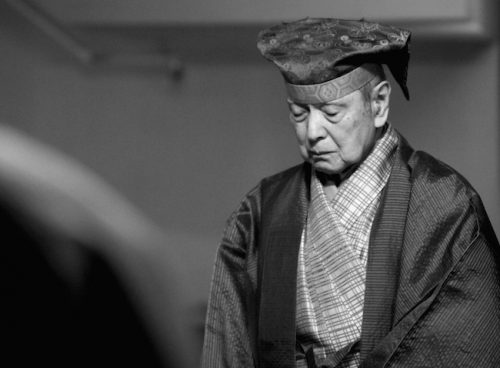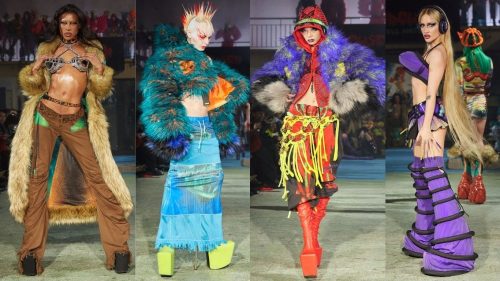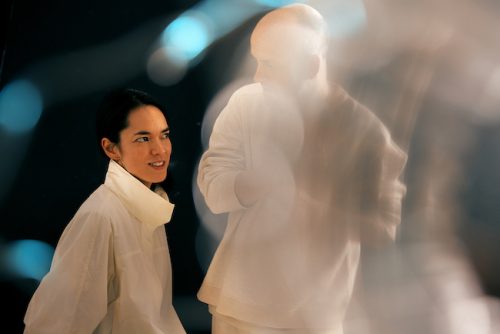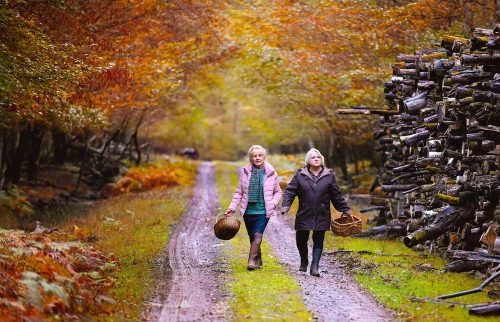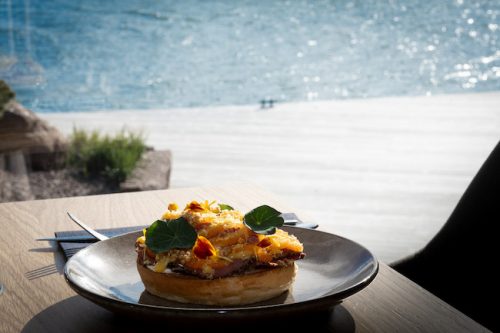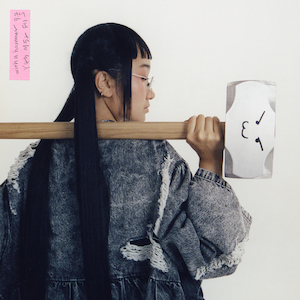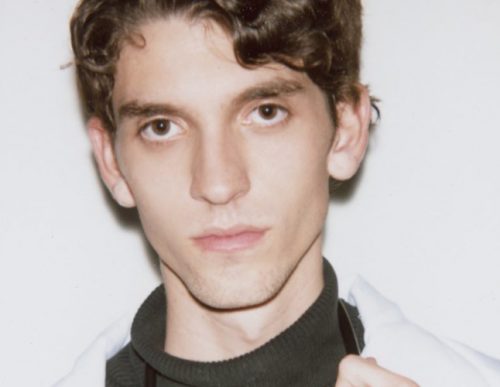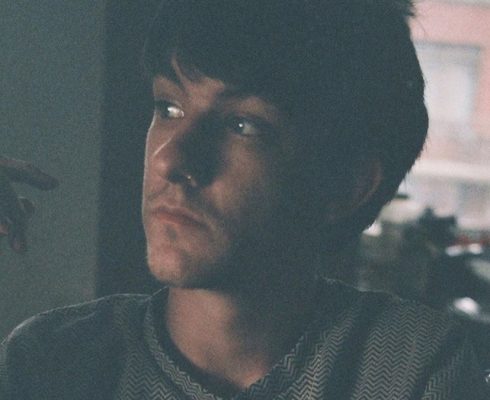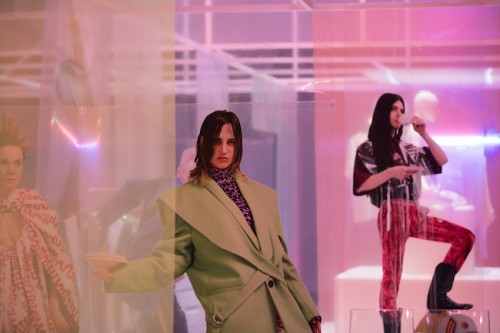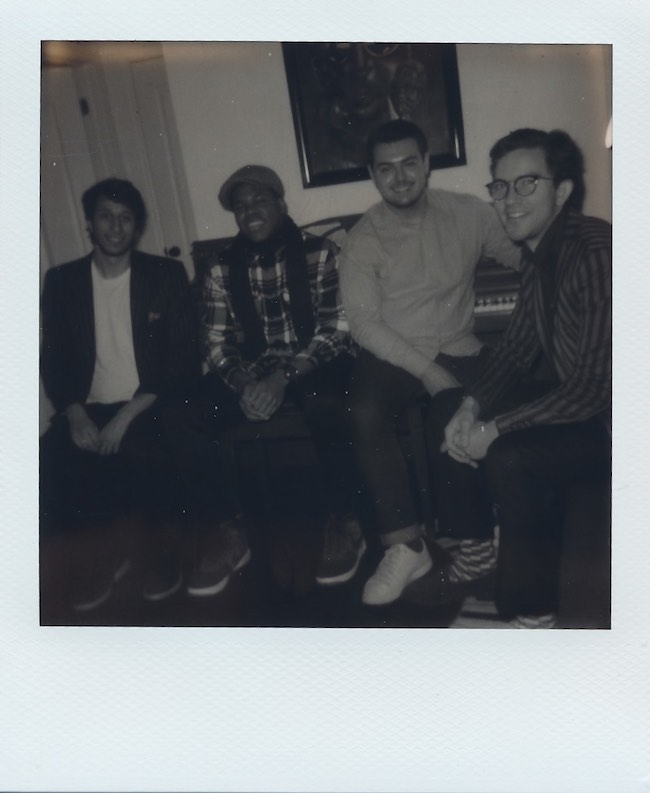
ジャズピアニスト、バンドリーダー、そして作曲家であるアイゼイア・ジェー・トムソン。彼は5歳でクラシカルピアノを始め、多くの音楽スタイルに挑戦していった。18歳でジュリアード音楽院に入学して以来、クリスチャン・マックブライド、ジョー・ファーンズワース、ロドニー・ウィテカーなどのメジャーアーティストと演奏している。リンカン・センターでの「ハンドフル・オブ・キーズ」でもウィントン・マルサリスとのジャズで注目された。今回はそんな彼と彼のカルテットを通して、若いジャズミュージシャン達が持つユニークな視点について聞いた。
Isaiah J. Thompson is a jazz pianist, bandleader, and composer. He began studying classical piano at the age of 5 and quickly branched out to other styles. He was admitted to the Juilliard School at 18 and since has performed with major artists including Christian McBride, Joe Farnsworth, Rodney Whitaker, and was featured on ‘Handful of Keys’ with the Jazz at Lincoln Center with Wynton Marsalis. We have the honor here to interview him and his quartet to see a unique point of view that these amazing young jazz musicians share.
――まず、自己紹介からお願いします。
Isaiah J.Thompson (Piano)「ジャズピアニストのアイゼイアです。ニュージャージー出身の21歳です」
Evan harris (Tenor Saxophone)「エヴァン・ハリスです。僕はオーストラリア出身の25歳です」
Zachary Adleman (Drums)「ザック・アイデルマンです。僕もニュージャージー州からで、22歳です」
Philip Norris (Bass)「フィリップです。ノースカロライナ州出身の21歳です」
――若いながら本当に素晴らしい成果を残していますが、音楽を始めたきっかけは?
Isaiah「親が何か習い事をさせたかったみたいで、フェンシングやタップダンスを習っていました。そしたらピアノをやってみたくなったので、ニュージャージーの音楽学校に通うことにして。続けるうちにジャズが大好きになり、ザックに会ったのもその学校のプログラムを通してです。かなりスパルタなプログラムで、本当に大事な内容ばかりを教わっていました。大きいバンドが二つと、もう少し小さいアンサンブルがありました。若いのに周りは自分の将来を真剣に考えてくれている人ばかりで、なんだか面白かった。幼い頃は自分がやっていることの意味の深さなんて理解できないですから。最初はあまり興味がなくてやめようと思ったことだってありました。でも自分が弾いている録音を聞くと、“やっぱりかっこいい”と思って続けたんです。親にいろんなプログラムに入れられて、気づけばピアノが人生になっていました。ずっとピアノを弾き続けたいと思い始めたのは、小学6年か中学一年生の頃ですね」
Evan「僕はシドニーで育ちで学生の頃はサックスをやりたくて。でも学校側はフルートを弾いてくれる人が必要だったのでフルートになってしまいました。そうやって2年生から中学3年生までフルートを吹いて、親にオーケストラに入れられて。とても楽しかったです。でもある時ステージバンドが楽しそうな音楽を演奏してるのを見て、またサックスをやってみたくなったんです。そこでやっと初めて、アイゼアイアが言ったようにサックスが人生になった。今まで一度も後悔したことはありません。ジュリアードの大学院プログラムに入りたかったのでニューヨークに引っ越しました」
Phil「僕はカナダで育ちました。両親はともにクラシックのミュージシャンで、お姉ちゃんがピアノを弾いていました。小さい頃から彼女が練習している音を聞いて、自分も同じ音を弾く遊びをしたりしてたら親にピアノプロラグラムに入れられて。ノースカロライナ州に引っ越してフリーランスでトランペットを弾いていた母はバンドのディレクターになりました。自分のバンドを始めた時も母がディレクターをしてくれました。僕はコルネットを吹きたかったのですが、母はフレンチホルンを吹けと言ってて。その後ベースを始めて最終的にベースを選びました。ベースは音楽の中でとても大事な音だと思うので、やっぱり1番好きです。ベースの音に惹かれます」
—First of all, please introduce yourselves.
Isaiah: I am Isaiah and I am a jazz pianist from New Jersey. I am 21.
Evan: I am Evan Harris and I am from Australia. I am 25.
Zach: I am Zach Adleman and I am also from New Jersey. I am 22.
Phil: I am Philip and I am from North Carolina. I am also 21.
—Wow. You guys have really accomplished a lot at such a young age. How did you all get started with music?
Isaiah: My parents wanted me to do something so they put me into a lot of different programs like fencing and tap dancing and stuff. And I wanted to play the piano so they put me into a music school in New Jersey. So I did that for a while and then found myself loving jazz. So that is where I started and that is also how I met Zach. And it was a very intense program, they were really teaching us the real stuff. There were two big bands and a few small ensembles. It is funny being young but having these people who are serious with you. Because like you can’t always understand the depth of what you are actually doing. I mean, at the very beginning I wasn’t that interested and there were times when I wanted to quit but then I watched the recording of my playing and I thought, alright this is cool. And then my parents put me into all sorts of programs and it pretty much became my whole life. And when I was in sixth or seventh grade, I thought that this is what I want to do for the rest of my life.
Evan: So I grew up in Sydney and I wanted to play saxophone when I was in school. But the school put me on flute because they needed that. So I had been playing flute since second grade. And then played the flute exclusively till maybe ninth grade. I liked it and my parents put me in orchestra and it was fun. Then I saw the stage band playing some fun music and I wanted to play saxophone again. And so I got started and it just sorta, as Isaiah said, became your whole life. I never regret it, well, not so far. I moved to the states because I applied for the master degree at Juilliard and so I moved to New York.
Phil: I grew up in Canada and both of my parents are classical musicians. My sister played the piano. So when I was young she would be practicing and I would hear what she’d play and go play the same thing. So my parents put me into a piano program. And then we moved to North Carolina and my mom was a freelance trumpet player and then she became a band director. And she was my band director when I started out the band. I wanted to play cornet but she told me to play french horn. I started playing bass later and ended up choosing bass. I think I love bass the most because sound really matters when it comes to music. I am really attracted to the sound of bass.
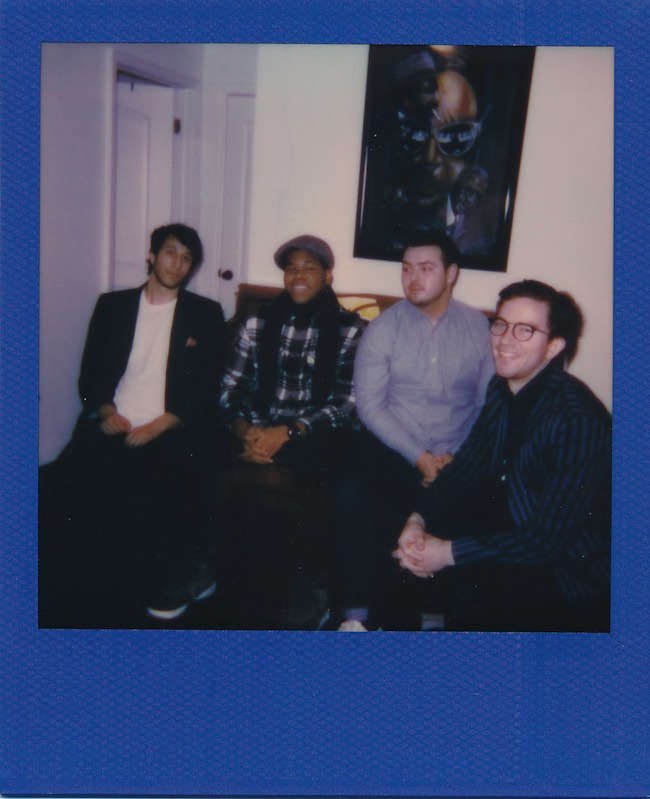
――そうなんですね。この前ライブの録音を聞いたのですが、やっぱりベースの音が目立っていました。バント内でお互いの音のハーモニーを理解するにはどうしていますか?
Isaiah「一番いい方法は過去のジャズミュージシャンの演奏を聞いて、それを真似することです。なので名高いミュージシャンの影響は僕たちの音楽にかなり観られるはずです。私達はたくさんのミュージシャンやアーティストが存在するコミュニティにいますが、人によって弾き方や目指す地点、値は異なります。他のバンドの弾き方を聞くと、“すごい、どうやったらああやって弾けるようになるのか、その練習ができるかな”と考えます。似たような目的や練習ができそうな人達は練習に呼んで、一緒にセッションをしたりします」
Phil「自分が普段誰の音楽を聴いているかにもよると思う。僕はレイ・ブラウンとクリスチャン・マクブライドをよく聴きます、彼らの音は必ず自分の耳に聴こえてくるから。バンドの中でサポート役の音を弾く人もいる。そうやって、自分が出す音とグループの中で持つ役目がバンドメンバーの演奏にも影響するんです」
ーー全員が共有するゴールがあるとしたら何ですか? 同じ価値観を持つ人達を見つけるのは難しいと思うんですけど、友達である上、アーティトやミュージシャンとして一緒にコラボできる人がいるのはとてもラッキーですね。全員で集まってグループとして成長していく感覚はどのようなものでしょうか?
Isaiah「とにかく僕達はおしゃべりで。昨日も朝5時まで話してたけど、普段からよくそういうことをしている。二日続けてショーをする時も3時まで演奏がどうだったか、どうしたらもっと良くできるかについて話し合っています。こうしなくてもいい人達もいるし、史上最高のバンドでも仲が悪かったりする。でも僕は話すことによってパーソナルな気持ちを演奏中に表現できるんです。“このセクション、どう思う?”“なんでそういう弾き方をして強をつけたの?”“次のためにどう変えていく?”とかを話して、さらに“なんでこうなったの?”“このセッションには合ってないんじゃない?”“だからそうしたんだね”って相手を理解しようと努力します。人の好みの問題であって、間違いなんてないんです。育ちが違うメンバーで集まっても共通点があるからこそ、一緒に音を作るのが最高に楽しい。でもそれぞれアーティストなので、違う意見や考えを持つのは当然です。このグループでジャズをやっているうちにお互いのアイデアがわかってきました」
—That is interesting. I heard your live performance the other day and the sound of your bass really stood out. How was it like to understand the sound of the harmony as band?
Isaiah: The best way we learn is by listening to the great jazz musicians and try to do the exact same thing. So those influence have definitely had the impact on how we are able to play in a certain ways but different people have different values. We are in a community with people who are all great musicians and artists, but sometimes they play in different ways and they have other goals. So when I hear other bands play I am like “Oh snap how can I do that and put it into my practice”. But I call these guys because we share similar goals and we also practice in the same way. The jam sessions could be different cuz there are always different people doing different things.
Phil: And it depends on who you listen to. I listen to Ray Brown and Christian McBride. The sound can always be heard. And there are other players who are more likely to be the supportive sound in the band. So that comes out in how you play and when you take on the role it will affect how others in the band may play.
—So what is the goal that you all share? It must be hard to find a group of people sharing the same value and getting along not just as friends, but also as collaborating artist/musicians. What is it like to actually get together and grow as a group?
Isaiah: Well. First of all, we talk a lot. We were up till 5 last night. And it happens a lot. There are times when we have to do gigs two nights in a row and we would stay up till three in the morning just to talk about how we performed and how we can make it better. Some people don’t need to. Some of the greatest bands didn’t really get along. I value talking with the people because we feel things personally and it comes out in our playing. We would be like “So what do you think about this section and why did you make that decision which affected the intensity? How do you like it? How can we change it next time?” So we would go to situations like “Why did this happen? You may be dragging on this session. Okay now I understand what you were trying to do.” Because no one is necessarily wrong. It is just about preference. We all come from different backgrounds and I called these guys and we love playing together because there are similarities. But we are all artists on our own so there are always going to be different opinions and ideas. But as we become more of a group, we will know each one’s idea within the music. And we would know what is most likely to happen even though the situations vary.
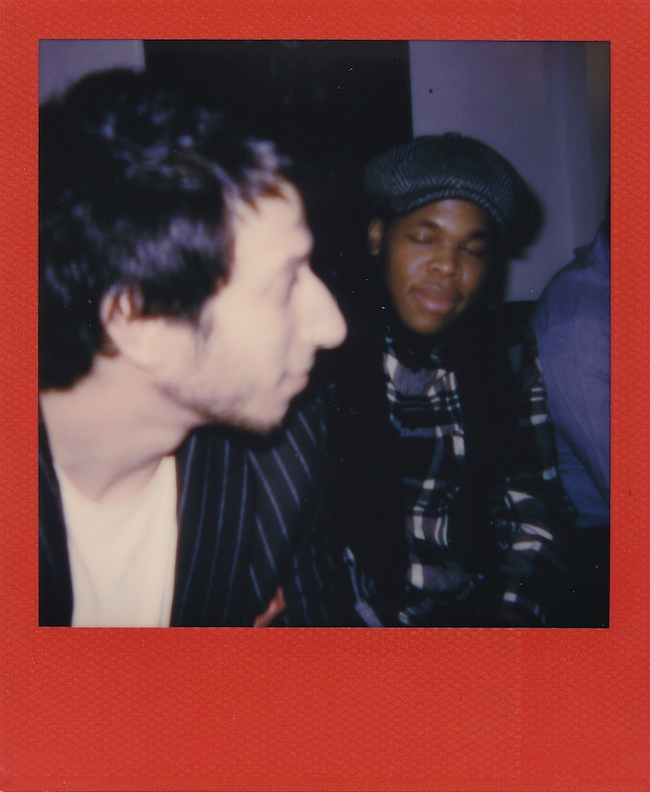
――なるほど。では全員の意見の違いなどはどういう風に乗り越えていますか? 自分達の経験や気持ちをとてもパーソナルに表した音楽が特徴的だと思いますが、そんな親しい気持ちを発信するのは難しくないですか?
Zach「アイゼイアがリーダーなので、彼のビジョンを大事にしています。この前はアイゼイアが好きなアイデアを話し合っていたんだけど、他の3人はあまり気に入ってなくて。それでも彼はやるぞとなって結局そんなに大きな問題じゃなくなりました」
Isaiah「確かに(笑)。もちろんみんなの意見も尊重するけどなにか特別自信があるものがある時はこだわって、みんなはそれを受け入れてくれます。みんなの考えはとても大事だし、そもそも自分がリーダーになるとは思っていませんでした。フィルにやらされたんです。音楽を書き始めた頃に彼に“バンドで音が目立つんだから、君がなんて言おうとリーダーだ”と言われて。僕がいつも言うのは、みんなまずは人間でミュージシャンとしてのアイデンティティはその後ついてくる。だからいつも誠実でいようとしています。バンドの仲は音楽にも反映されるので、何かおかしかったり話さなくてはいけないことがある時はすぐに話し合います。意見が違う時も多いだけど、喧嘩はしません」
Phil「ザック意外は全員ジュリアードに通っているので、よく会うんですよね。お互い会っていない間に違う弾き方を取得してきて、全員で弾いた時に音が変わっていることがあります。なので、ザックがいない時に3人で弾いてその後彼が戻って来ると誰がどんな音を出していいのかわからなくなります。でもみんなで弾いているうちに必ずまとまってくる。例えば、今週は僕がタイミングと音の強さについて話していたんですが、朝5時までビデオを観て音を聴くことから一番の成長がみられました。自分の演奏を聴くと人にも伝わりやすいのでこれが一番いい方法だと思っています。頭で“あの時どう弾いたかな”って考えるよりも、事実として残っている音を再生する事で全員納得するように変えていくことができます」
Isaiah「人間性が一番コアにあるということもとても大切です。何でも知っている人なんて存在しないし、間違えることは悪くない。いつも完璧でいようとする人もいるけど、僕達はそうじゃない。人間だし、誠実であることが大事」
Zach「音の強さや強弱を大事にしているところがユニークなんじゃないかなと思う。できた時は最高だけど、僕達にとってはチャレンジです。静かに弾いている時は、強い音を出す前に強弱をつけようとしているからです。大きい音を出す時も、コントロールしなくてはいけないからね。音の強さの研究は諦めません」
Isaiah「そう、強度は重要。演奏が難しい曲を書くこともあるので、強度をつけないと人は帰ってしまう。僕達の会話によく出てくる内容です。テンポを掴むのが難しいので、弾いている時の感覚が良いかどうかをお互いに確かめます。ミュージシャンとして気持ちよく音楽を弾きたいだけなんです」
—I see. So how are you dealing with the differences? Your music is so touching that it is based on your personal feelings and experience and then you transform it into your playing. But sometimes it is difficult to articulate and interpret the sensational experience. How do you guys deal with that?
Zach: I think it has to do with Isaiah’s vision because he is the leader. The other day we were debating over a session and the three of us didn’t quite like it but Isaiah really liked it. So he was like okay we are gonna do it. And at the end of the day it is not that big of a deal.
Isaiah: Haha true. I respect everyone but when I feel strong about something I’d stick to it and they would just got used to it. I value their opinions very much and I didn’t think that I would be the leader. Phil made me do it. I started writing these tunes and Phil said that sometimes when your sound stands out in a band, you don’t really have a choice. So I became the leader. I say it all the time that I believe we are all human first and the identity of a musician comes second. And I always try to treat things with integrity. And the bond we have with each other is very much the reflection of how we play. So that is really important. Even though sometimes things are not cool and I can feel it, whether if it is musical or not, we can always talk about it later. Because what is important to me is that to treat people with respect. We disagree all the time but we never fight.
Phil: We see each other a lot because we all go to Juilliard but Zach goes to Michigan State. And in between the time that we are not together, each of us might develop a different way of playing which might affect us as a whole. So when the three of us go see a jam session and Zach is missing, he might not know what we are talking about. So then sometimes we don’t know what each person is going for. But as we come together and play, we figure things out. This week we were talking about time and intensity. Mostly me talking about it. I was trying to get everyone understand how I felt about it. And then I think the most exciting progress we made was that we all sat down on the couch last night till 5am and we watched the video and listened to it. And when I heard what I was trying to talk about, I was like “Did you hear that?” And they are like “Yeah. I was playing too loud. Why would I do that?” So that is the best way to do it. To watch the recording together. You have the idea of what is in your head, but watching it is like understanding the truth, and so we would agree on things and make changes.
Isaiah: It is also very important to remember that humanity is the core. Not every person is supposed to know everything. You can be wrong and that is okay. Sometimes when things go wrong you can just be like “Oh yea, that went wrong. My bad.” It is okay to be wrong. There are people who are so uptight about everything and think that they have to be right all the time. But that is not us. You are human. Being truthful is the key.
Zach: I feel like how we value the explosion and intensity is making us unique. It is amazing but also it is a challenge to achieve something like that. When we are quiet, we are still trying to maintain the intensity. And when we are loud, we wanna maintain the control. And also never giving up on the intensity.
Isaiah: Yea.Intensity very much matters. I sometimes write certain songs that are hard to play and so the intensity has to be in a certain way or people will leave. That is one thing we talk about a lot. And we ask each other if we are feeling right when we play. Because the tempos are just hard to play. And we are just trying to be musicians and play music the right way.
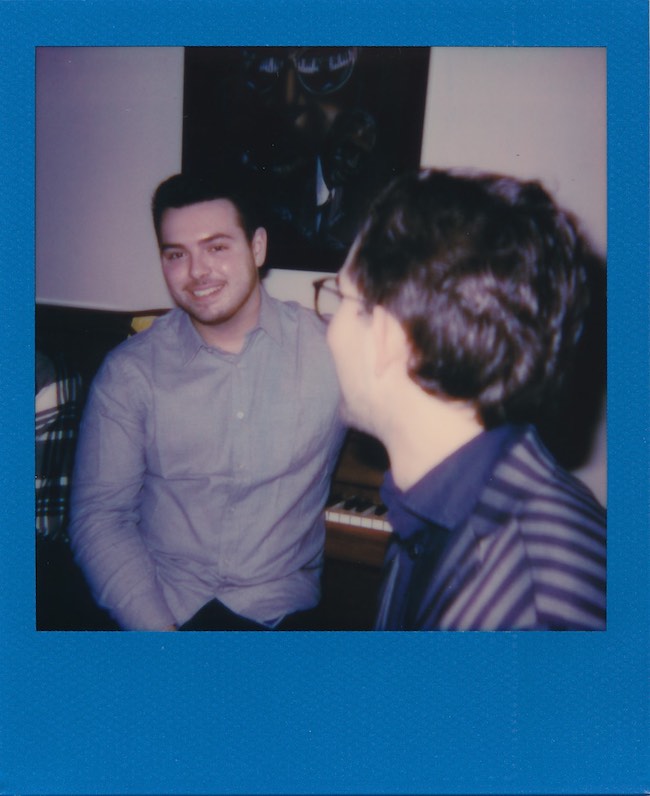
――わざとらしく聴こえてしまわないようにするには、どんなバランスを取っていますか?
Phil「スポーツのチームのように、バンドには選手がいますよね。それぞれ自分が何をするかわかっていてアイデアはあるけど、実際何が起こるかは試合までわかりません。ボールが回ってきても自分が誰に回すかはその時の決断。その決断によってゲーム全体が変わってくる。試合を見ている人は見ていてつまらない時もあって、そうすると帰ってしまいます。でも逆にとても盛り上がって、観客が立ち上がる時もある。そうやって僕達も演奏中に誰かの音を聴いて、お互い一緒に弾いていくのです。お互いの弾き方を感じあってパフォーマンスをしています」
――素晴らしいチームワークですね。
Evan「一つ一つの決断にみんなが関わっています。誰かが音を変えようとしていることに対して、その流れに乗るか全く違うものを加えるか決めることができます。それが良い時と悪い時があるけど、大体お互いの音を聴いてうまく音を変えようとしない時に失敗する。だから新しいことに挑戦したいという気持ちや可能性を大事にしています。音楽以外もこういう決断に影響しているところもユニークだと思う。いつもお互いの演奏を聴き合って、その時弾いた音によっていろいろ変わります。Dizzy’sでは4夜続けて演奏しましたが、毎回違う演奏でした。毎日アイデアが変わる4人が集まって作ったものです。それに自信を持って、他とは違うジャズバンドとしてやっています」
―――短期間でたくさんの情報を読み取るのは難しそうですね。
Isaiah「そう、アイデアも選び抜かなくてはなりません。4人で何千もの決断を一瞬でしているので」
Phil「そして結果が出てもそんなに考えてる暇はありません」
Isaiah「そうそう。分析しようとしてもできない。ただやるだけ。同じ音を弾かないようにするのは難しいです。でも個人的に仲が良いので感覚でわかることが多いかな」
Phil「一つの勢いがきていても自分では感じないし、決断も無意識で自然にできています。ナチュラルに起こることだからこそ、その場に合っているのではないかと思います」
Zach「アイゼイアがさっき言っていたように、人間性が第一だと思う。それは全員にとって重要なこと。でもみんなのことをよく知っていても、心を読むことはできないのでちゃんと口で確かめます。聞かなきゃわかりませんし、コミュニケーションをとるんです。お互いをハッピーにすることは大事なので妥協し合いますよ」
—Talking about getting the intensity out. Sometimes it could be difficult because you don’t want things to sound forced. So how do you manage to find the balance?
Phil: If you go to a sports game, like in a sports team, there are different players. And everyone has the idea of what they are trying to do. So we have the idea. But no one actually knows what is going to happen. Because whoever gets the ball can pass it to whoever he wants. And if they end up passing it to that person, something may happen that is different. And if you watch sports game, you’d find out that sometimes it gets really boring. Because no one can get the intensity going forever. So you see people walking out because it is boring. But then there are certain times when everyone is feeling it and they pass the ball well and the crowd gets excited and the intensity keeps building up. When that happens, the team itself has a momentum and it just happens to score. It just kinda happens. No one knows. So when we are playing, we have the ability to be like, if any of us makes a decision, and we all go with it, and we didn’t even think about it. We just keep going. Even when we don’t agree, we can still hit the point and lead up to the intensity and the overall feeling of the performance.
—Sounds like you are a really good team!
Evan: Everyone is aware of the decision being made. Every moment there is someone making a decision which has the potential to either continue where we are going or change it completely, that can be positive or negative. So when it is effective is when the four of us are playing and we are not mindful of the possibilities of changing things. We are open minded to the possibilities. We commit to the change of direction and we continue to make decisions. It is informed by all things, not just the musical ideas. So that is a pretty unique. We listen to each other pretty much the whole time. Each tune we play is shaped in the moment, and it is not necessarily repeating the same thing over and over. We played the same thing at Dizzy’s four nights in a row. And each night we play it differently. That is just because four individuals have their ideas changing each night. We would just embrace it and go with it. That is the commitment and that is what makes us unique as a jazz band.
—That is very intense. It is like unpacking information in a short time period.
Isaiah: Yes. You have to pick and choose the ideas. There are thousands of decisions being made by each of us and it is pretty fast.
Phil: And you get the best result when you don’t really think about it.
Isaiah: Exactly. It gets to a point when you can’t really focus on analyzing. You just do. It is hard because you don’t want to play the same thing over and over again. But we know each other personally really well so we sorta understand the situation intuitively.
Phil: Like once the momentum is happening and you can feel it, your decisions aren’t conscious. They just happen. They end up being the good decisions because they are just natural.
Zach: I think it goes back to what Isaiah was saying before. Humanity comes first. That is really important to all of us. I mean I sometimes ask them to explain what they are doing because even though I know everyone as a person, I can’t read their mind. I need to ask to know. We communicate. It is important to make each other happy so we compromise.
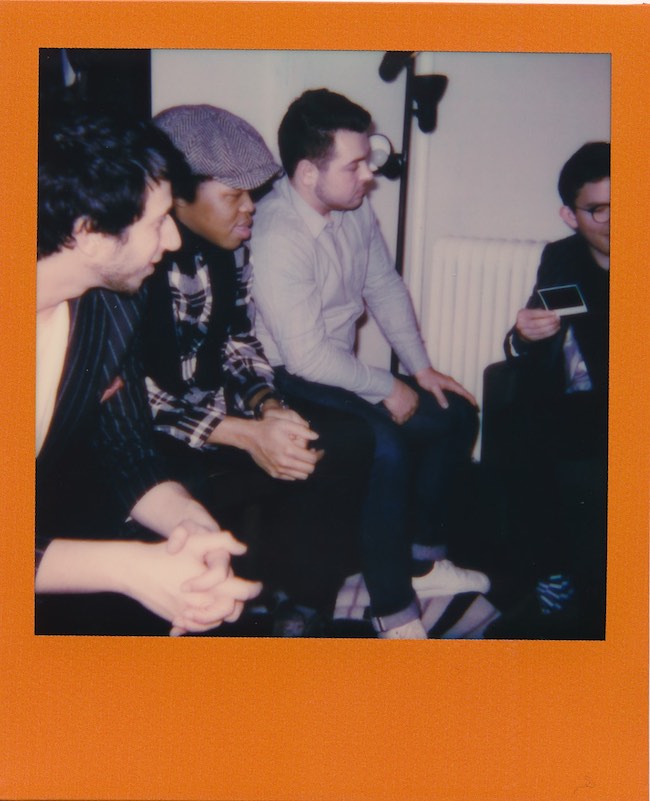
――どんな時や内容について妥協をしますか? バンド内での自分の役目は何だと思いますか?
Isaiah「他のバンドで演奏してたことがあって、“よし、やろう”となったけど自分だけ納得いかなかったことがあって。でも実際やってみたら“やっぱいいじゃん”って思えるようになりました」
Phil「人との関係のように、人によってどんな態度をとるか変わります。この人とはこういうことをして、あの人とは自然にできちゃったり。自分の好みだと思いますね」
Evan「そういう人とは一緒に弾いていて心地良いです。失敗しても、誰かがかばってくれるってわかっているので安心して弾ける。1人が演奏を途中で辞めたとしても音が崩れるわけではないので。エンジン一つでも飛べる飛行機みたいに」
Isaiah「ちゃんと混ざり合うように音を加えていかなければならないので、難しいです。レイヤーを増やしていく感覚というか」
Zach「ドラマーとしての役目は曲の形をつくることだと思います。曲がなければ僕の仕事はない。ベースのフィルと弾く時が一番気持ちいいです。大まかにいえば、文脈を加えていくことが僕の仕事です」
Phil「うん。僕は一番音が低い楽器で、楽器の中でも一番音が静かです。あまり自由に弾ける楽器でもないので、みんなを追って音を安定に保っています。大事なのはいつ入っていつ抜けるか。僕が抜けた時にみんなができる音もあるからね。ぼくがやりすぎても邪魔になってしまうので、ちょうど良い具合を見つけるんです」
Evan「アイゼイアと一緒にメロディーの責任をつくっています。事前に決めたものでもアドリブでも、構造をレイヤーで加えています。僕が効果を与えてメロディーを2人で作っていくんです。常に2人で話し合いをしているみたいに」
Isaiah「うん、そうだね。僕もそう思う」
—What do you all feel about compromising? What if you feel strong about something and others don’t feel the same? And what would you consider your role as in the band?
Isaiah: There was this one time I was playing with someone in a band and people were like “Let’s do this.” And I was like I really don’t wanna do this. And we did it and I was like “Oh okay this is fine.”
Phil: It is almost like relationships. Everyone functions differently when they are with different partners. So you might not do a certain things with this person, but you can easily do it with someone else. That is your preferences.
Evan: And it is always comfortable playing with them. In case you fall, you know someone is there to catch you. Any one of us can just stop playing, and it would still sound nice. Like an aircraft that can fly on one engine.
Isaiah: It is very hard since things have to make sense. If you are playing solo you have to add something on top of the sound of the group that is adding another layer.
Zach: As a drummer what I do mostly is shaping a song. If there is no song, then I got no job. To me it feels good to play with Phil because he is the bass player. In general, I feel like what I do is to contextualize.
Phil: Yea. I would say I am the deepest instrument but also the quietest, comparing to other instruments. And I don’t have much freedom, I just go with them and keep things constant. The important thing is when to go with it and when to get out of their way. So when you get out of their way, they can do a certain things. I feel like I am the grass. If I get too tall, I am blocking the way. You want to have a nice walk on the grass.
Evan: I think I share the responsibility of playing the melody with Isaiah. Whether it is composed or improvised. I build the texture and the layer. I provide the effect. We phrase the melody together. We are constantly in dialogue with each other.
Isaiah: Yea. I feel the same way.
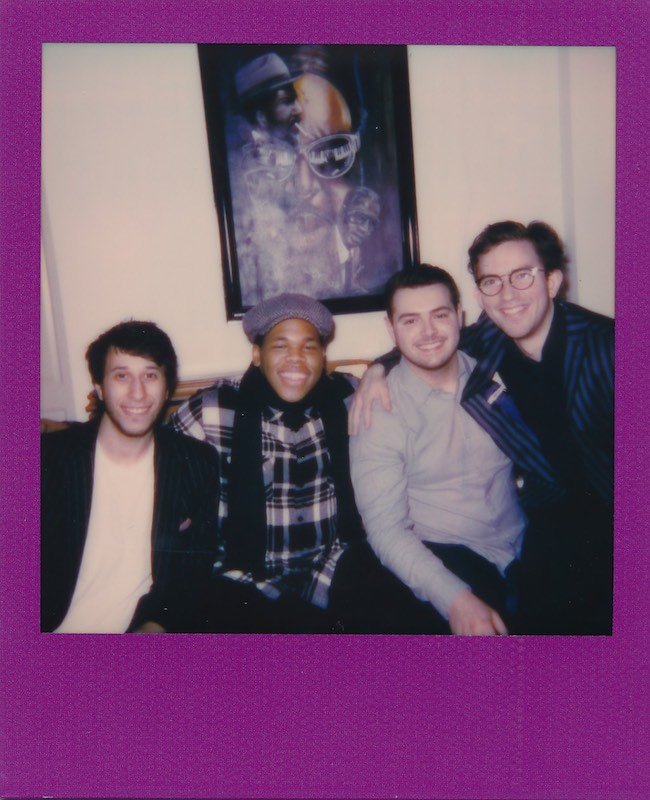
――素晴らしい。今おっしゃったことはあなた方の音楽をどこへ導いているのでしょう? 最終的なゴールは何ですか?
Isaiah「僕のヴィジョンに段々近づいて行くことがゴールです。僕自身もヴィジョンを常に具体化しているし、ヴィジョンに近づいても自分が何を聴いているのか整理して把握しなければいけない時があるので面白い(笑)。でもこの3人となら同時進行で両方できる。リハーサル真っ最中に“こうしたい”って説明することもあります。今後も4人で旅行し、演奏し、成長し、勉強し続けると思います。生活を楽しむことが目標です。良い心を持ち、良いミュージシャンになること」
――とても心に響きました。夢のような生活に思えます。素敵なお話をありがとうございました。今後も応援しています!
—That is very impressive! So where do you think this is leading to now? What is the goal?
Isaiah: The goal is to get closer and closer to the vision that I have and I am trying to define it more and more specifically. We are getting closer to what I am actually hearing and I have to figure out what I am hearing, so that is funny. But with these guys, I always feel like I can do both at the same time. Sometimes during rehearsals I am like “Oh okay this is what I am trying to do” and then I explain to them. But I think for us, traveling, playing, getting better and studying music is what we will always be doing. I don’t know. Being people. That is our goal. To be good people. And then good musicians.
—Wow. That is absolutely touching. You guys really are living the dream life. Thank you so much for having this conversation! Wish you all the best of luck!
https://www.isaiahjthompson.com
photography & text Baihe Sun
